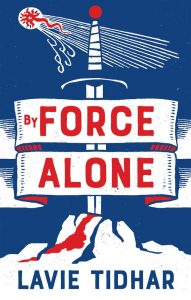BY FORCE ALONE by Lavie Tidhar (Book Review)
“Arthur stalks off. He doesn’t build, he doesn’t read, he wields a sword and kills without compunction and therefore he is king. And he will take this damned forsaken island with its thousands of squabbling tribes and lordlings and make something of it if he has to destroy it in the process.
A shared identity, Merlin thinks. A story to unify all these warring tales, so that Britons now and centuries to come could tell each other that they share a thing. That they are one. And to be one, as Arthur understands implicitly, you must be defined against an other.
Whether the stories have any truth to them whatsoever matters not in the least.”
Lavie Tidhar’s previous novels have used a unique mix of pulp fiction tropes to explore serious issues in striking and surprising ways. Osama (2011), The Violent Century (2013) and A Man Lies Dreaming (2014) use ideas from noir detective stories, alternate history and superhero comics to bracingly explore the darker recesses of 20th and 21st century history, their oblique approach to 9/11 and the concentration camps of World War II allowing us to see the horrors of recent history through a fresh and disturbing perspective. By Force Alone (2020), his latest novel, takes on the legend of King Arthur, and, as one might expect from Tidhar, it is a slyly subversive retelling that forces the reader to reconsider the Arthurian mythos in the light of modern Britain’s Brexit nationalism. By Force Alone is a joyous rush of a novel, sweeping up everything from grimdark to gangster films to kung fu to Russian science fiction in its wake, and somehow pulling them together into a coherent whole that critiques Britain’s toxic self-image and the lineage of the Fantasy genre itself.
 In his afterword Tidhar talks about the connection between the Arthurian legends and British nationalism, from Geoffrey of Monmouth’s original invention of the stories for the Norman king, later expanded, ironically enough mostly by writers on the continent, to Thomas Malory’s Le Morte D’Arthur (1485) at the beginning of the Elizabethan empire and the rediscovering of the texts at the height of the Victorian empire. By Force Alone makes this connection clear. Tidhar strips away the warmth and nostalgia associated with Arthurian lore to engage with the brutish nastiness of the original stories. This is a tale after all where Arthur is conceived by rape and rises to power by murdering the competition, something Tidhar never lets the reader forget. This is achieved through Tidhar’s games with genre and genre expectations. By Force Alone reimagines Arthur as a vicious, conniving gangster, his Knights of the Round Table as a motley assortment of thugs and bullies. By engaging with the tropes of gangster films, Tidhar strips away the façade of chivalry and glory, and instead makes us think of knights as racketeers, using their swords and their power to exploit the peasants and contributing little back to society other than protection from other racketeers. The fantasy of knights as noble and serving a higher cause is turned on its head, as their actions and motives are shown to be nothing but self-serving, the moral code of the Knights of the Round Table nothing more than a dubious code of honour amongst thieves, ignored or exploited as often as followed. In this novel, Arthur is a cold-eyed, power-mad psychopath, his followers little better, and the great wizard Merlin is a manipulative fae parasite who feeds on power and bloodlust, caring little for the outcome and less for those who might be hurt or killed than getting his next fix of ghastly violence.
In his afterword Tidhar talks about the connection between the Arthurian legends and British nationalism, from Geoffrey of Monmouth’s original invention of the stories for the Norman king, later expanded, ironically enough mostly by writers on the continent, to Thomas Malory’s Le Morte D’Arthur (1485) at the beginning of the Elizabethan empire and the rediscovering of the texts at the height of the Victorian empire. By Force Alone makes this connection clear. Tidhar strips away the warmth and nostalgia associated with Arthurian lore to engage with the brutish nastiness of the original stories. This is a tale after all where Arthur is conceived by rape and rises to power by murdering the competition, something Tidhar never lets the reader forget. This is achieved through Tidhar’s games with genre and genre expectations. By Force Alone reimagines Arthur as a vicious, conniving gangster, his Knights of the Round Table as a motley assortment of thugs and bullies. By engaging with the tropes of gangster films, Tidhar strips away the façade of chivalry and glory, and instead makes us think of knights as racketeers, using their swords and their power to exploit the peasants and contributing little back to society other than protection from other racketeers. The fantasy of knights as noble and serving a higher cause is turned on its head, as their actions and motives are shown to be nothing but self-serving, the moral code of the Knights of the Round Table nothing more than a dubious code of honour amongst thieves, ignored or exploited as often as followed. In this novel, Arthur is a cold-eyed, power-mad psychopath, his followers little better, and the great wizard Merlin is a manipulative fae parasite who feeds on power and bloodlust, caring little for the outcome and less for those who might be hurt or killed than getting his next fix of ghastly violence.
But By Force Alone is more than just a grimdark reimagining of a familiar set of legends. Tidhar is interested in the central irony of British nationalism, that the great myth of the formation of Britain has been interpreted and reinterpreted as a nationalist text by successive waves of immigrants, from the Anglo Saxons to the Normans and onwards, all to lay claim to a piece of land which has always been inhabited by immigrants. From the sword in the stone sequence onwards, Merlin garners support for Arthur and his band of thugs by whipping up nationalist, xenophobic hatred among the locals for the Angles, Saxons and Jutes, who will in turn be replaced by the Normans, for whom Geoffrey of Monmouth will construct the Arthurian legends as a nationalistic myth. And Merlin himself realises he is selling pernicious bullshit – he later reflects on the absurdity of anyone laying claim to any stretch of land. He knows damn well that he is simply selling the public on an easy lie to further his and Arthur’s spurious claim to the throne, based entirely on power and violence, and so he can inspire them to give their lives for a cause that benefits them not one jot, so that they do not see that it is Merlin and the knights who are exploiting them. Thus Tidhar uses his take on the Arthurian mythos to point out the hypocrisy and stupidity of nationalism, pointing out that nationalism itself, fuelled so often by a combination of comfortable nostalgia and misinformation, is nothing more than a duplicitous fantasy.
Arthuriana is not only baked into Britain’s sense of identity, it’s also a crucial building block of Fantasy as a genre, from Tolkien patterning the Lord of the Rings on the grail quest to the numerous reimaginations, retellings and references to King Arthur and the Knights of the Round Table throughout the Fantasy canon. By questioning our relationship towards the Arthurian legends as a text, Tidhar is also using a Fantasy novel to examine our relationship to Fantasy. Tidhar’s brutal, fast-paced and witty take means that By Force Alone can sit proudly on the shelves next to the most well-known grimdark series of today. But crucially, Tidhar is engaged with questioning the will to power and the ideas of inheritance and righteousness that fuel so much Fantasy, but frequently get swept under the carpet in the enthusiasm to get to the kick-ass action scenes. By continually reminding us that Arthur, the template for so many of Fantasy’s chosen ones, only achieves power because he is willing and able to use brute force to get and maintain it, Tidhar makes us question the chosen one archetypes that run through the genre. In the last battle between Arthur and Mordred, Tidhar’s focus is less on the grand spectacle of a climactic battle, and more concerned with the lives ruined, the people sent off to be killed in meaningless slaughter, the poor and dispossessed who wind up trodden on by those in power. Tidhar also questions the consolatory promise of Fantasy – is it there to make us feel better, and should it? As a dying Arthur is put on a boat to be thrown into the sea, Merlin tells the surviving Knights a comforting tale about Arthur healing on Avalon and waiting to return at England’s time of need, but like all of Merlin’s stories, it’s just a self-serving lie he has made up on the spur of the moment to get the reaction he wants. Maybe Fantasy shouldn’t make us feel better, or at the very least we should honestly question texts that do.
Yet the book’s serious intent does not make By Force Alone a difficult read. It is a book that is both funny and fun. Tidhar has a wonderful time stretching the stories into unfamiliar genres and shapes, whilst maintaining the core of the tale which has seen its appeal last for so long. Thus we get the grail quest reimagined through the lens of Arkady and Boris Strugatsky’s masterpiece of weird soviet SF Roadside Picnic (1972), we get Lancelot’s wuxia adventures as a kung fu master, we get Arthur’s reputation-making stunt of robbing the local drug dealers of their shipment of Goblin Fruit. Throughout the text there are references to sources as diverse as Kurt Vonnegut’s Slaughterhouse Five (1969) and Quentin Tarantino’s Kill Bill (2003). Once again, By Force Alone shows the power and playfulness of Tidhar’s imagination, as he uses pop culture to make us confront grim political reality, all whilst having a whale of a time. It is this that makes him one of today’s most essential and unpredictable writers.


[…] ‘BY FORCE ALONE is a joyous rush of a novel, sweeping up everything from grimdark to gangster films to kung fu to Russian science fiction in its wake, and somehow pulling them together into a coherent whole that critiques Britain’s toxic self-image and the lineage of the Fantasy genre itself… BY FORCE ALONE shows the power and playfulness of Tidhar’s imagination, as he uses pop culture to make us confront grim political reality, all whilst having a whale of a time. It is this that makes him one of today’s most essential and unpredictable writers.’ — Fantasy Hive […]
[…] ‘BY FORCE ALONE is a joyous rush of a novel, sweeping up everything from grimdark to gangster films to kung fu to Russian science fiction in its wake, and somehow pulling them together into a coherent whole that critiques Britain’s toxic self-image and the lineage of the Fantasy genre itself… the book’s serious intent does not make BY FORCE ALONE a difficult read. It is a book that is both funny and fun. Tidhar has a wonderful time stretching the stories into unfamiliar genres and shapes, whilst maintaining the core of the tale which has seen its appeal last for so long… BY FORCE ALONE shows the power and playfulness of Tidhar’s imagination, as he uses pop culture to make us confront grim political reality, all whilst having a whale of a time. It is this that makes him one of today’s most essential and unpredictable writers.’ — Fantasy Hive […]